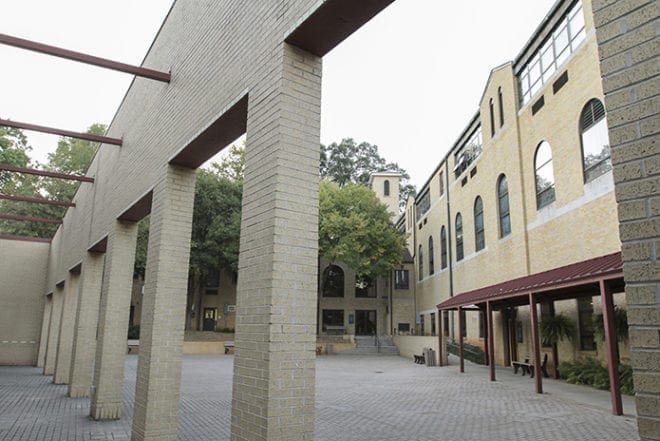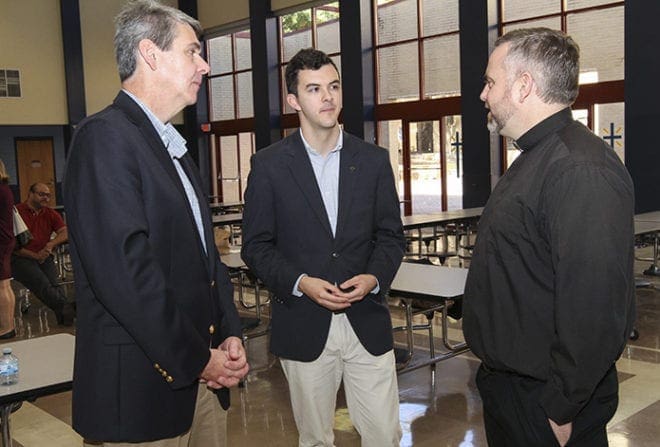Jesuit Father Mark Horak, second from the left, pastor of St. Thomas More Church, Decatur, leads a prayer before the Oct. 25 school advisory council meeting. Those praying with him include (clockwise from left) Augusto Elias, a member of the archdiocesan school advisory council, parish school principal Jerry Raymond and parish school advisory council members Beth Morrison and Shawn Kowalewski. Photo By Michael Alexander
Decatur
At 75, St. Thomas More Church keeps evolving, discovering what it means to be a Jesuit parish
By ANDREW NELSON, Staff writer | Published November 17, 2016
DECATUR—With a 75-year history, some 4,000 believers, and a successful school, this Decatur community of faith is asking itself some basic questions about its future.
Members of St. Thomas More Church are figuring out “whom will we serve” and “how will we serve.”

Peering through the columns of Mulhern Hall provides a view of the school building, right, and the church, background. Mulhern Hall, the parish activity center, was dedicated in 1994 in honor of its beloved pastor Father Patrick Mulhern. Father Mulhern, who died nearly a decade ago, was the pastor from 1987-1999. Photo By Michael Alexander
Jesuit Father Mark Horak, the new pastor, is leading the parish to ask fundamental questions about itself and where it fits in the archdiocese as it transitions to becoming a Jesuit parish.
“What makes God smile, what makes God cry” about the parish is a question he wants its members to consider. The parish’s vision will guide its future outreach at the edge of downtown Decatur.
“‘Ask yourself, what am I doing here? What is God asking of me?’ It kind of keeps us on course, keeps us connected to the work of Jesus,” said Father Horak, explaining the directive to parish leaders. Lay leaders for now are wrestling with these questions. The whole faith community will weigh in soon, as the process unfolds.
Expansion of Jesuits in Atlanta
The parish was founded in 1941 before the establishment of the archdiocese. Three parishes were formed from its original boundaries, as Catholics moved into the expanding Atlanta area: Immaculate Heart of Mary Church, Atlanta; Sts. Peter and Paul Church, Decatur; and Corpus Christi Church, Stone Mountain.
Up to now, a priest of the archdiocese had always served St. Thomas More as its spiritual leader. In January, the parish held a packed party as a rousing sendoff for pastor Msgr. Paul Fogarty as he retired after 48 years of priestly service. In February, Archbishop Wilton D. Gregory handed the care of the parish to the Maryland Province of the Society of Jesus.
And now folks at the parish are being schooled on St. Ignatius of Loyola, the Society of Jesus he founded, and Ignatian spirituality that finds God in all things.
Jesuits aren’t strangers to the archdiocese. But in three years, members of the Jesuit order have expanded beyond the longstanding Ignatius House, founded in 1960 by the Jesuits of the New Orleans Province, to sponsor the two-year-old Cristo Rey Atlanta Jesuit High School, and to serve the 75-year-old Decatur parish. In addition, Jesuits from Korea continue to serve in Atlanta’s Korean Catholic community.
At St. Thomas More, more than 400 students attend the award-winning parish elementary school, which recently earned, for the second time, a coveted Blue Ribbon of Excellence from the U.S. Education Department. The sisters of Notre Dame de Namur staffed the school for many years, but lay teachers lead it now. The school is also looking at what it does through the lens of Jesuit spirituality.
Former lawyer, pastor wants Jesuits to serve archdiocese
In his office, mascots of the Ohio native’s Cleveland Indians and Cleveland Browns, share a shelf with a judge’s gavel. Father Horak trained as a lawyer but considers his legal practice inactive.
He entered the Society of Jesus in 1985 and was ordained a priest in Baltimore in 1994. He taught law and founded a nonprofit legal services program with Catholic Charities for eight years.
Father Horak served at parishes in Philadelphia and, most recently, in Washington, D.C. He worked for a time in the South as a parochial vicar at St. Peter Catholic Church in Charlotte, North Carolina, but he calls the Decatur parish the most diverse he’s served in.
Catholics here are Africans, African-Americans, from India, people of color from around the globe, in addition to white parishioners, he said. “I see people who are happy to be here,” he said.

(R-l) Jesuit Father Thomas Kenny, vice president for Mission and Ministry, Religious Studies, at Cristo Rey Atlanta Jesuit High School, chats with Caleb Weaver and his dad Robert during a reception for Jesuit Friends and Alumni Sunday at St. Thomas More Church’s Mulhern Hall. Caleb is a 2016 graduate of Georgetown University, Washington, D.C. Father Kenny, a graduate of Boston College and Loyola University in Chicago, resides at the Decatur parish. Photo By Michael Alexander
Father Horak said Mass celebrations will be a key feature of parish life as the community fashions its future. In a note to parishioners he wrote how Jesuits prioritize celebrating the sacraments “especially the Eucharist in a spirit of creativity and with a willingness to adapt to the cultural realities of the community it serves.”
To move in that direction, a music director was recently hired to work with a liturgy director to enhance worship. The parish is also encouraging its members to have children baptized at Sunday Mass, not in private ceremonies.
Father Horak added, “Church is primarily not an ethical code. It is a relationship with Jesus, that’s what the church is all about.” Parishioners will “encounter the God who above all, and only, loves them,” he said.
Other key points of a Jesuit parish are evangelization by outreach; collaboration between clergy and lay people; commitment to justice with a “preferential love of the poor”; and understanding of the Jesuit spirituality that finds God in all things.
The Jesuit community of six men lives in the brick rectory beside the church. They work at the retreat house, Cristo Rey Atlanta Jesuit High School and the parish. He said a goal for the community is to make Jesuit spirituality available to archdiocesan parishes and other ministries.
Looking to the future by listening to their hearts
The school community also has taken to the wisdom of the 476-year-old religious community.
“This year we have really immersed our students in the various aspects of Ignatian spiritual thought. Most days all the students in grades K-8 say the daily Examen Prayer which emphasizes gratitude and finding God in all things. Our students are very conscious of promoting social justice and reaching out to those in need,” said principal Jerry Raymond.
Last spring, many faculty members formed a book club relying on Jesuit Father James Martin’s “The Jesuit Guide to Almost Everything,” to learn the history and traditions of the Jesuits. Raymond said several families enrolled at the school because of the religious order’s reputation. The Jesuits and their spirituality only add to the school’s history, he said.
The parish lay leaders are taking responsibility for the parish in a new way. An expanded group of leaders is building consensus around what should be the parish priorities. In early 2017, the community will have a chance to shape the priorities as the parish plans to build from its history.
Susan House, a member of the parish council for eight years, said shaping the parish mission is taking her beyond her usual focus on numbers.
“That’s been the biggest thing, to let go of facts and figures and listen to my heart,” said House, who works at the Emory School of Medicine.
Anh Phillips is new on the parish council. She works for a global corporate consulting firm, so she knows about data-driven decisions. But she’s experiencing a new way of making decisions: “We begin with the prayer and (following) the heart and then go into data afterward,” she said.
At the parish council meetings, Father Horak leads them on guided meditations for several minutes, she said, encouraging people to look at issues “from God’s eyes.”
The parish leadership examined Jesuit documents and the Archdiocesan Pastoral Plan. The effort is “blending those two together and see what percolates,” House said. “People are ready to do some good work.”